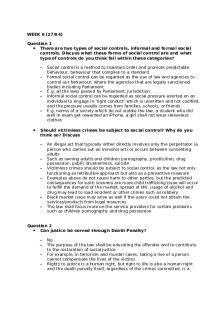Tutorial 3 - medicalisation of deviance PDF

| Title | Tutorial 3 - medicalisation of deviance |
|---|---|
| Author | Lovita Ramsein |
| Course | Sociology |
| Institution | Rhodes University |
| Pages | 4 |
| File Size | 172.6 KB |
| File Type | |
| Total Downloads | 25 |
| Total Views | 145 |
Summary
medicalization of deviance and the understanding of homosexuality being medicalized...
Description
1. Tutorial Three: Medicalisation of Deviance (7 & 8 October) There are no written submission due on the question below; rather, it will form part of the discussions during the tutorial. “The social constructionist perspective suggests that deviance should be regarded as lodged in a process of social definition rather than in some objective feature of an object, person or act” (Adler and Adler, 2009: 149). Critically discuss this statement with specific reference to the medicalisation of deviance. You should also link this discussion to the process in the medicalisation of homosexuality. The constructionist perspective holds that supposedly deviant behavior is a voluntary act, an expression of human volition, will, or choice. Constructionists take this stand because they are disturbed by what they claim to be the dehumanizing implication of the positivist view of deviant behavior. The medicalization of deviance thus refers to the process whereby nonnormative or morally condemned appearance (obesity, unattractiveness, shortness), belief (mental disorder, racism), and conduct (drinking, gambling, sexual practices) come under medical jurisdiction. Medicalization is a sociological concept explaining how medicine can be applied to behaviors that are not self-evidently medical or biological. Early emancipators of homosexuality reasoned that if homosexuality was biologically determined, homosexuality would no longer be regarded as immoral and would be exempted from legal prosecution. The medicalization of homosexuality has not delivered this liberation. Research in the 1950s established that homosexuality was not per se associated with psychopathology and that a medical label for homosexuals was scientifically unfounded. This was reflected in the removal of homosexuality from classification systems of psychiatric diseases. The transition from sin-to-sickness-to-status has had a positive impact on the well-being of homosexual people.
Written Submission: 8 October @ 16:00
What is the medicalisation of deviance? (check slides for more info!) Define the following concepts: overmedicalization, demedicalisation and remedicalisation. Who are the agents of medicalisation? Explain the role of each. What is the inductive theory of the medicalisation of deviance? Relate this to the medicalisation of homosexuality.
Explain the process in the medicalisation of homosexuality.
Prescribed Readings Conrad, P. (2007). The medicalization of society: On the transformation of human conditions into treatable disorders. Baltimore, Maryland: Johns Hopkins University Press. [Chapters 1 & 5]. Conrad, P & Schneider, J.W. (1992). Deviance and medicalization: From badness to sickness (expanded edition). Philadelphia: Temple University Press. [pp. 1-3, 17-28, 35-37, 266-276]. The medicalization of deviance thus refers to the process whereby nonnormative or morally condemned appearance (obesity, unattractiveness, shortness), belief (mental disorder, racism), and conduct (drinking, gambling, sexual practices) come under medical jurisdiction. Medicalization has occurred for both deviant behavior and "natural life Page 5 MEDICALIZATION AND SOCIAL CONTROL 213 processes." Examples of medicalized deviance include: madness, alcoholism, homosexuality, opiate addiction, hyperactivity and learning disabilities in children, eating problems from overeating (obesity) Overmedicalization refers to non-validated medical practices, with no clear benefits, potentially harmful and therefore unnecessarily costly. ... Overmedicalization is made possible by a lack of training of health professionals and users on medical decision process. Definition of Demedicalization (noun) The process by which a behavior or condition, once labeled “sick”, becomes defined as natural or normal. Medicalization can be driven by new evidence or hypotheses about conditions; by changing social attitudes or economic considerations; or by the development of new medications or treatments. The medicalization of deviance thus refers to the process whereby nonnormative or morally condemned appearance (obesity, unattractiveness, shortness), belief (mental disorder, racism), and conduct (drinking, gambling, sexual practices) come under medical jurisdiction. Medicalization is a sociological concept explaining how medicine can be applied to behaviors that are not self-evidently medical or biological. Early emancipators of homosexuality reasoned that if homosexuality was biologically determined, homosexuality would no longer be regarded as immoral and would be exempted from legal prosecution. The medicalization of homosexuality has not delivered this liberation. Research in the 1950s established that homosexuality was not per se associated with psychopathology and that a medical label for homosexuals was scientifically unfounded. This was reflected in the
removal of homosexuality from classification systems of psychiatric diseases. The transition from sin-to-sickness-to-status has had a positive impact on the well-being of homosexual people. 1. Medicalization dates back to the 1960s and has evolved since then. We can define medicalisation as a social process and as a sociological concept. In the psychiatric and medical fields, the concept of medicalization has been widely applied. Medicalization is the process of defining, diagnosing, and treating conditions as medical conditions so that they can be studied, diagnosed, prevented, and treated as such. This approach defines a problem with medical language, explains it within the parameters of a medical framework, or treats it with medical interventions. Sociologists coined the term medicalization to explain the application of medical knowledge to behaviour that does not seem to be medical or biological. A process in which beliefs, appearances, and behaviours (drinking, gambling, sexual practices) that are non-normative or morally condemned are included in medical jurisdiction. Using medical terms to define human experience narrows the spectrum of what is deemed acceptable and normal (Conrad, 2007: 7). Deviance is assigned a moral status different from crimes or sins through the construction of illness. Applied to illness, this assumes that failures within the human body cause behaviours or conditions. In medicalization existing categories can be redescribed, for instance ADHD, once regarded as a childhood issue but now regarded as a lifelong condition. Medicalization can also be described as cyclical in nature. 2. The term "demedicalisation" refers to the process in which a problem is no longer defined in medical terms and medical personnel are no longer deemed necessary. Remedicalisation deferring demedicalisation back to a medicalized aspect. Overmedicalization is defined as the use of medical practices that are not validated, are not proven to work and are potentially harmful. Health professionals and users are not trained on how to make medical decisions, resulting in overmedicalization.
3. (n/a) 4. Deviance is medicalized in a variety of ways, including alcoholism, mental illness, opiate addictions, eating disorders, behavioural problems, and educational disorders. Numerous new categories arose as a result, including ADHD, PMS, PTSD, and Chronic Fatigue Syndrome (CFS). In this new medical regime, what used to be labels of immorality, sin, or criminality are now labelled as diseases. The medicalization of a
number of common life processes has been ongoing for decades, including anxiety and mood, menstruation, birth control, infertility, childbirth, menopause, aging, and dying. 5. The concept of medicalization explains how medicine can be applied to behaviours that are not clearly medical or biological. In the early days of emancipation of homosexuality, homosexuality was construed as immoral and legal prosecution prohibited. If homosexuality was biologically determined, then we could no longer assume its immorality. Medicalization of homosexuality has not liberated us from this assumption. A large body of research in the 1950s established there was no direct connection between homosexuality and psychopathology and that homosexuality was an unfounded medical diagnosis. As a result, homosexuality was removed from the classification systems of psychiatric diseases. Having gone from sin-to-sickness-tostatus has positively impacted the health of homosexuals....
Similar Free PDFs

Deviance
- 5 Pages

Sociology of Deviance (Erikson)
- 9 Pages

Sociology of Crime & Deviance
- 4 Pages

Deviance
- 5 Pages

Deviance essay
- 5 Pages

Medicalisation - Grade: 66%
- 6 Pages

Deviance chapter
- 32 Pages

Tutorial 3
- 3 Pages

Tutorial 3
- 4 Pages

Tutorial 3
- 4 Pages

Tutorial 3
- 12 Pages

3 - tutorial
- 6 Pages

Social Deviance
- 2 Pages
Popular Institutions
- Tinajero National High School - Annex
- Politeknik Caltex Riau
- Yokohama City University
- SGT University
- University of Al-Qadisiyah
- Divine Word College of Vigan
- Techniek College Rotterdam
- Universidade de Santiago
- Universiti Teknologi MARA Cawangan Johor Kampus Pasir Gudang
- Poltekkes Kemenkes Yogyakarta
- Baguio City National High School
- Colegio san marcos
- preparatoria uno
- Centro de Bachillerato Tecnológico Industrial y de Servicios No. 107
- Dalian Maritime University
- Quang Trung Secondary School
- Colegio Tecnológico en Informática
- Corporación Regional de Educación Superior
- Grupo CEDVA
- Dar Al Uloom University
- Centro de Estudios Preuniversitarios de la Universidad Nacional de Ingeniería
- 上智大学
- Aakash International School, Nuna Majara
- San Felipe Neri Catholic School
- Kang Chiao International School - New Taipei City
- Misamis Occidental National High School
- Institución Educativa Escuela Normal Juan Ladrilleros
- Kolehiyo ng Pantukan
- Batanes State College
- Instituto Continental
- Sekolah Menengah Kejuruan Kesehatan Kaltara (Tarakan)
- Colegio de La Inmaculada Concepcion - Cebu


